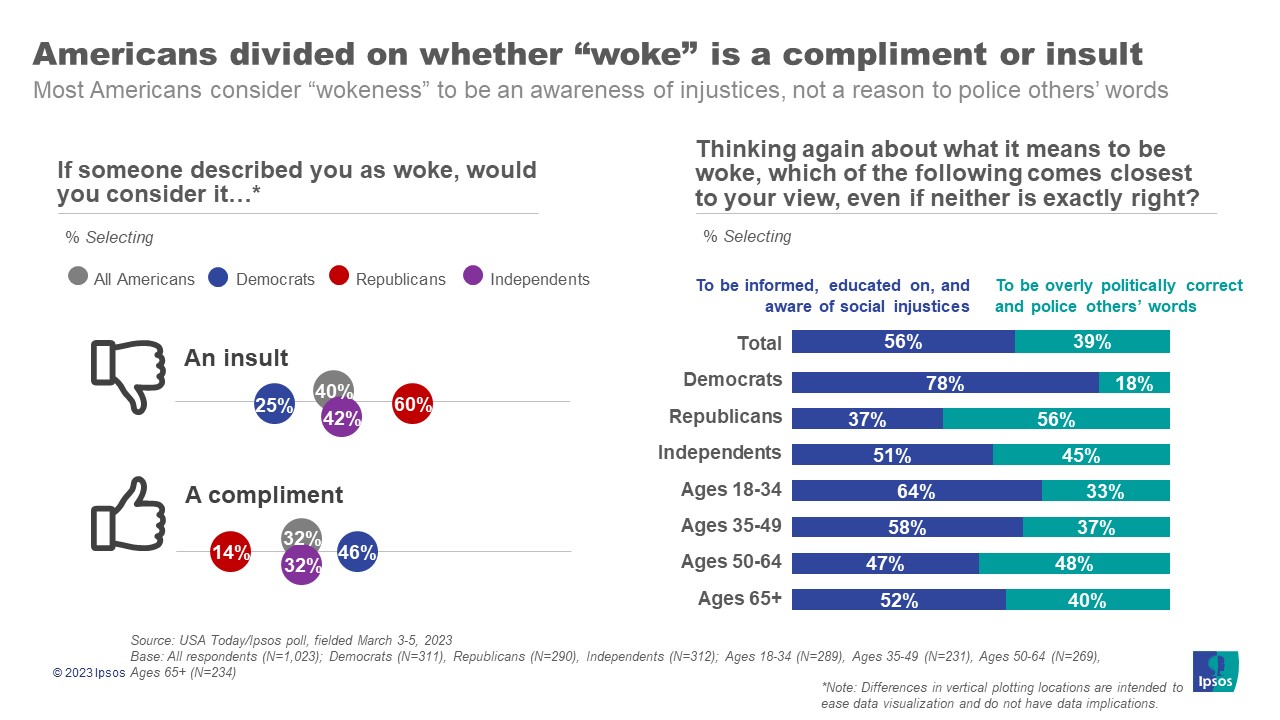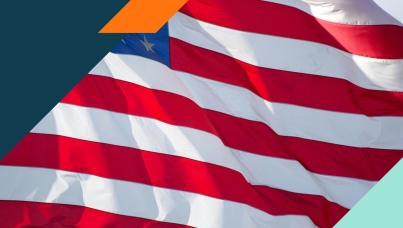Americans divided on whether "woke" is a compliment or insult
Washington, DC, March 8th, 2023 – A new USA Today/Ipsos poll finds that Americans are divided on whether “woke” is a compliment or an insult. When asked what it means to be "woke," however, a majority say it entails being informed about social injustices rather than being overly politically correct. Differences by party and age emerge around views on “wokeness,” with Democrats and younger Americans more likely to see “wokeness” as a compliment than Republicans and older Americans, respectively.

Detailed Findings:
1. Americans are divided on whether “woke” is an insult or a compliment. This division is largely fueled by differences in party affiliation and age.
- Two in five (40%) say they consider “woke” to be an insult, but about a third (32%) consider it a compliment.
- While a majority of Republicans (60%) and a plurality of independents (42%) consider “woke” to be an insult, nearly half of Democrats (46%) say they take it as a compliment.
- Similarly, Americans ages 18-34 (43%) are more likely than those ages 50-64 (23%) or 65+ (19%) to view “woke” as a compliment. Compared to those ages 18-34 (21%), though, Americans ages 65+ (38%) are significantly more likely to say they do not know what “woke” means.
2. Americans are less divided over the definition of “wokeness,” as over half say “wokeness” means being informed about social injustices. Differences by party and age, however, remain present.
- Fifty-six percent of Americans say “wokeness” encompasses being informed, educated on, and aware of social injustices. In contrast, two in five (39%) say “wokeness” involves being overly politically correct and policing others’ words.
- A vast majority (78%) of Democrats say being “woke” means being informed, while nearly three-fifths (56%) of Republicans say it means being overly politically correct. Compared to Democrats and Republicans, however, independents are more divided on the definition of “wokeness,” as 51% say it involves being informed and 45% say it means being overly politically correct.
- Americans ages 50-64 (48%) are more likely than those ages 18-34 (33%) or 35-49 (37%) to view “wokeness” as being overly politically correct.
About the Study
This USA Today/Ipsos Poll was conducted by Ipsos from March 3 to March 5, 2023, using the probability-based KnowledgePanel®. This poll is based on a nationally representative probability sample of 1,023 adults age 18 or older. The sample includes 311 Democrats, 290 Republicans, and 312 independents.
The survey was conducted using KnowledgePanel, the largest and most well-established online probability-based panel that is representative of the adult U.S. population. Our recruitment process employs a scientifically developed addressed-based sampling methodology using the latest Delivery Sequence File of the USPS – a database with full coverage of all delivery points in the U.S. Households invited to join the panel are randomly selected from all available households in the U.S. Persons in the sampled households are invited to join and participate in the panel. Those selected who do not already have internet access are provided a tablet and internet connection at no cost to the panel member. Those who join the panel and who are selected to participate in a survey are sent a unique password-protected log-in used to complete surveys online. As a result of our recruitment and sampling methodologies, samples from KnowledgePanel cover all households regardless of their phone or internet status and findings can be reported with a margin of sampling error and projected to the general population.
The study was conducted in English. The data were weighted to adjust for gender by age, race/ethnicity, education, Census region, metropolitan status, and household income. The demographic benchmarks came from the 2022 March Supplement of the Current Population Survey (CPS). Party ID benchmarks are from recent ABC News/Washington Post telephone polls. The weighting categories were as follows:
- Gender (Male, Female) by Age (18–29, 30–44, 45–59 and 60+)
- Race/Hispanic Ethnicity (White Non-Hispanic, Black Non-Hispanic, Other, Non-Hispanic, Hispanic, 2+ Races, Non-Hispanic)
- Education (Less than High School, High School, Some College, Bachelor or higher)
- Census Region (Northeast, Midwest, South, West)
- Metropolitan status (Metro, non-Metro)
- Household Income (Under $25,000, $25,000-$49,999, $50,000-$74,999, $75,000-$99,999, $100,000-$149,999, $150,000+)
- Party ID (Democrat, Republican, Independent, Something else)
The margin of sampling error is plus or minus 3.3 percentage points at the 95% confidence level, for results based on the entire sample of adults. The margin of sampling error takes into account the design effect, which was 1.15. By party ID, the margin of sampling error is plus or minus 5.8 percentage points for Democrats at the 95% confidence level, plus or minus 6.0 percentage points for Republicans at the 95% confidence level, and plus or minus 5.8 percentage points for independents at the 95% confidence level. The design effect was 1.11 for Democrats, 1.07 for Republicans, and 1.10 for independents. The margin of sampling error is higher and varies for results based on sub-samples. Sampling error is only one potential source of error. There may be other unmeasured non-sampling error in this or any poll. In our reporting of the findings, percentage points are rounded off to the nearest whole number. As a result, percentages in a given table column may total slightly higher or lower than 100%. In questions that permit multiple responses, columns may total substantially more than 100%, depending on the number of different responses offered by each respondent.
About Ipsos
Ipsos is one of the largest market research and polling companies globally, operating in 90 markets and employing over 18,000 people.
Our passionately curious research professionals, analysts and scientists have built unique multi-specialist capabilities that provide true understanding and powerful insights into the actions, opinions and motivations of citizens, consumers, patients, customers or employees. We serve more than 5000 clients across the world with 75 business solutions.
Founded in France in 1975, Ipsos is listed on the Euronext Paris since July 1st, 1999. The company is part of the SBF 120 and the Mid-60 index and is eligible for the Deferred Settlement Service (SRD).
ISIN code FR0000073298, Reuters ISOS.PA, Bloomberg IPS:FP www.ipsos.com



